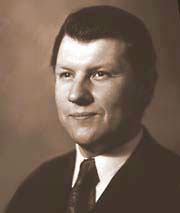
Vladislav Agafonnikov (b. 1936) is a composer and head of composition at Moscow Tchaikovsky Conservatory of Music. He has been awarded the high rank of People's Artist of the Russian Federation. He serves as vice-president of the All-Russian Union of Composers and is the Shostakovich Prize Laureate of the All-Russian Union of Composers. He has been a member of the European regional group of the International Music Council (ERG) since 1986.
Agafonnikov is the author of four operas, two ballets and many symphonic, chamber, choral and vocal compositions. His style is very lyrical, for it combines Russian folk and quasi-folk melodic and harmonic structures and forms unique to Russian music, like the variation.
Agafonnikov's music has been performed in all major music festivals in Russia and other countries of former USSR as well as in many foreign countries. (b. 1936) is a composer and head of composition at Moscow Tchaikovsky Conservatory of Music. He has been awarded the high rank of People's Artist of the Russian Federation. He serves as vice-president of the All-Russian Union of Composers and is the Shostakovich Prize Laureate of the All-Russian Union of Composers. He has been a member of the European regional group of the International Music Council (ERG) since 1986.
Agafonnikov is the author of four operas, two ballets and many symphonic, chamber, choral and vocal compositions. His style is very lyrical, for it combines Russian folk and quasi-folk melodic and harmonic structures and forms unique to Russian music, like the variation.
Agafonnikov's music has been performed in all major music festivals in Russia and other countries of former USSR as well as in many foreign countries.
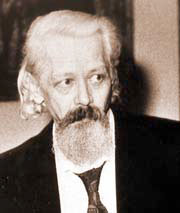
Yuri Boutsko (b. 1938) has devoted his life and art to adapting the old Russian chant (called "znamenny rospev") to modern times, while at the same time preserving its context and religious meaning. The znamenny chant is interpreted by Butsko as "the ideal of spiritual perfection, a goal to be constantly pursued." The composer has constructed an original system determining the "method of working with znamenny chant." The underlying principle of the system is a melodic scale extracted from znamenny chant (the ancient Russian tone-row). Although the scale is limited by the compass of a human voice, Boutsko extends it in by adding tri-tones [or trichords] above and below until the initial starting pitch is restored. The system is open and contains twelve tones. Boutsko describes it as a kind of Russian dodecaphony, applying a twelve-tone row extracted from Russian material. Boutsko's religious approach determines specific qualities of his music: extended durations, a continuous elaboration of each image or motive, and an absence of sharp contrasts. The ever intense 'tone' and the need to shape an exhaustive statement generate the quality of "extended time," sometimes to the extent of meditation.
Boutsko's music has been widely performed in Russia and many other countries.
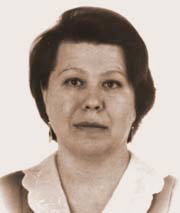
Irina Dubkova (b. 1956) is a composer who works in the international office of the Moscow Tchaikovsky Conservatory of Music as well as in its department of composition. She is a former student of Roman Ledeniov, and is the author of two symphonies and other symphonic compositions, ballets, chamber works, choral and vocal pieces as well as compositions for children. Her music is very lyrical, delicate and impressive.
Dubkova's symphonic, chamber and vocal music have been performed across the Russia (in Saint-Petersburg, Ekaterinburg, Briansk, Novgorod, Kaluga, Yaroslavl, Ulan-Ude, Smolensk, Pskov, Vitebsk, and Moscow). Her music has also been heard in France, Germany, Austria, Switzerland, Holland and Finland.
Her compositions have been regularly performed in the Yearly International Music Festival "Moscow Autumn".
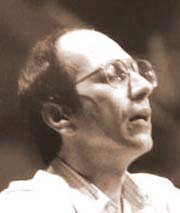
Andrey Golovin (b. 1950) graduated from Moscow Conservatory in 1976 and studied composition with Prof. E. Golubev and instrumentation with Prof. Y. Phortunatov. He graduated from the Post-Graduate Course of Moscow Conservatory in 1979 and has been teaching composition at the Gnessin Academy of Music in Moscow.
After a period of writing music influenced by Messiaen and Jolivet, he consciously proceeded to a more traditional Russian style. Based on the preservation (not the destruction) of the existing cultural strata, his recent works are more tonal and melodic, allowing him the freedom to concentrate less on formal issues and more on content.
Golovin's music has been performed in major music festivals in Russia and other countries.
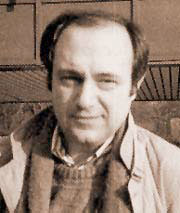
Faraj Karaev (b. 1943) studied at the Baku Conservatory (1961-1971) with his father, a famous Soviet composer Kara Karaev. He taught composition and the theoretical courses there and at the Moscow State Conservatory. He organized a number of orchestras and music festivals in Baku and Moscow. As an avant-gardist and a member of ASM (Association for Contemporary Music), Karaev developed his own style of musical expression, including elements of instrumental theater as well as painting, literature, dramatic and the plastic arts. He often uses "mobile" and "open" forms, and quotations from the music of different composers including the music of his father.
Karaev's music has been performed at important music festivals in Azerbaijan, Russia, France, the United Kingdom, Germany, and Switzerland.
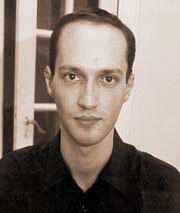
Leonid Karev (b. 1969) is a composer and organist, and has lived in France since 1992. He has continued the Russian tradition by adapting the old Russian chants and Russian folk songs to contemporary music. Karev is a student and follower of Yuri Boutsko. His music is defined by its nature: it is often heavy and dark and yet revealing its sincere character, its author's "Russian soul". Karev works mostly with chamber, vocal and organ music.
Karev is a wonderful organist, the Prizewinner of the International Tournament of Music of Rome (1999/2000), First Prize winner of "Marcel Dupré" organ competition (1998), and the First Prize of honor winner given by the unanimous l'U.F.A.M. jury, Paris, France (1996).
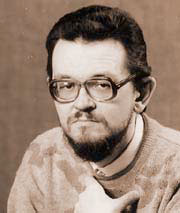
Mikhail Kollontay (b. 1952), a composer and pianist, is the author of many large symphonic, choral, and chamber pieces. His music is highly lyrical, full of sonority and emotion. The main principle of his compositional technique is the detailed accuracy by which he executes his ideas, structurally, formally, and notationally. Kollontay thinks and works polyfunctionally, polyphonically-in large dimensions. The composer's pieces are extremely complicated for performance. However, these scores sound extraordinarily bright and clear-the visual heaviness of the musical texture stratifies into graphic lines of a vocal type.
In 1981 Mr. Kollontay became the winner of the All-Union Competition of Pianists, and in 1982 he participated in the Tchaikovsky International Competition where he was awarded a diploma and a prize for the best performance of the compositions by Tchaikovsky. His concerts sent him to many European countries, as well as the US and Japan. Currently Mr. Kollontay is a Professor of Piano at the Moscow State Conservatory. His compositions have been performed in the USA, Germany, England, Scotland, France, Austria, Australia, Sweden, The Czech Republic, Slovakia and other countries.
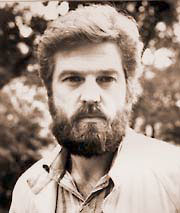
Nikolai Korndorf (b. 1947), one of the most prominent Russian composers of his generation, has lived in Canada since 1991. His music combines different styles and techniques, various musical materials (the medieval chorale, elements of modern rock music, folk music and 'underground' music) and contains the characteristic features of romantic music, European vanguard music, instrumental theater and American minimalism. All this is not mixed up simply in his compositions but very thoughtfully organized into an emotionally deep and philosophically serious whole, within distinct structures and forms. The composer's music discusses the problems of spiritual life, of beauty and ugliness, of a person's relations with the surrounding world. Korndorf started as an avant-garde composer, writing atonal and expressive music. Around 1980 he turned towards tonal music in order to achieve more stability in his compositions and express a single major emotional state in each of them. He has created a Russian kind of minimalism, which employs a very deep, conceptualistic meaning, capturing the atmosphere of a national Russian sound.
Korndorf's music has been widely performed in Russia, Germany, Canada and other countries.
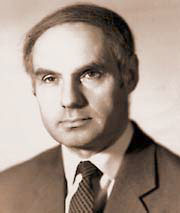
Roman Ledeniov (b. 1930) writes beautiful, highly lyrical music without any sign of showing-off or willingness to attract its audience. He used to compose in the New Viennese style, but starting around 1972 he returned to a more traditional Russian style, using Russian folk and QUASI 19th-century neo-romantic music within a minimalistic texture. The majority of his works are symphonic, choral, vocal and chamber.
Ledeniov is the Secretary of the All-Russian Union of Composers, the People's Artist of Russia, is a Laureate of the Russian State Prize, and is currently a Professor of Composition at the Moscow Tchaikovsky Conservatory of Music. His music has been widely performed throughout the world.
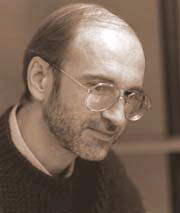
Vladimir Nikolayev (b. 1953) has experimented with different genres within academic, electro-acoustic and theater music. Formally and motivically, his compositions are very strictly systematized, and this organization can be distinctly heard in the music. At the same time, his music is often based on the mysterious transformations of noise into strange sounds, of simple verbal-syllabic combinations into something similar and yet approaching a new and beautiful language. The composer does not like to comment on his compositions because he believes his music speaks for itself: it's very warm, comfortable, vivid and easy to listen to.
Nikolayev is a laureate of the First International Vitold Lutoslawsky Competition, Warsaw (1991), and received the First Prize Laureate of the Lili Boulanger Memorial Fund (Boston, 1992). He is a permanent participant of the international festivals of contemporary music in Moscow and other cities in Russia as well as abroad.
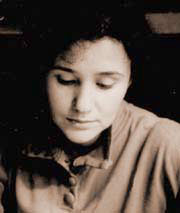
Olga Rayeva (b. 1971) graduated from the Moscow State Tchaikovsky Conservatory (1994) with Prof. E. Denisov (Composition & Orchestration) and Prof. Dr. Yu. Cholopov (Music Theory). In 1994-1996 she attended postgraduate courses with Professors E. Denisov and V. Tarnopolski. Since 1993 she participated in a number of seminars for composition in Germany under prominent German professors, such as P. H. Dittrich, G. Staebler, and M. Spahlinger. Rayeva has been a member of the Moscow Composers' Union and the Russian Contemporary Music Association since 1995. Rayeva is the first prize winner of the "Goffredo-Petrassi" Competition for orchestral compositions in Parma (1997), and a Laureate of the International Composers "Forum '98" in Montreal, Canada.
Her compositions have been performed in a large number of international music festivals in Russia and other countries such as: Moscow Autumn, Moscow-Modern, Muzicki Biennale Zagreb, Music Bridge (New York), Heidelbergisches Internationales Festival für Neue Musik, NovAntiqua (Cologne), Vom Grunde des Leidens (St. Pölten), Moscow Forum, Alternative, Gaudeamus Musik Week, Moskauer Kuenstler in Berlin, Festival for Russian Music (Gent), "Kremerrata Musica" (Lockenhaus), ISCM World Music Days (Seoul), Dresdner Tage für zeitgenössische Musik, Wiener Tage für russische Musik, and Russische Musikwoche Bern.
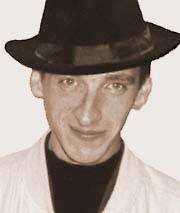
Dmitri Riabtsev (b. 1969) is the author of many chamber, vocal and orchestral music, including compositions for the orchestra of Russian folk instruments, for the theater and cinema. Riabtsev is the adherent of a kind of "new simplicity" and "new tonality" using post-minimalism elements. At the same time, the composer has worked out a special system using a 24-tone row, which is employed inside tonal or modal structures. A special element of his system is rhythm, which uses the regular metrical schemes displaced against bar lines as well as other rhythmic irregularities. His compositions are usually very expressive and lyrical. The composer has a bright melodic gift, that is why his music is always full of polyphony, each voice of which is distinct and has a unique color. His instrumental canvas are notable for the faultless listening of the timbres and the clearness of the textures.
Riabtsev's music has been performed in the festivals of contemporary music in Moscow, St. Petersburg, Novosibirsk, Israel and other venues.

Albina Stefanou (1969) is a composer and sound designer. She studied composition at the Tchaikovsky State Conservatory in Moscow (she finished her post-graduate studies in 1995). Since 1993 Albina was experimenting with electro-acoustic music at Theremin-Center in Moscow, continuing her education in computer music at Dartmouth College, NH (M.A. in 1997). Her compositional style varies from avant-garde computer music to funny pseudo-Russian songs for kids, from lyrical symphony music to impressionist chamber ensembles. A very special instrument for her is the human voice used in her pieces as speech, vocalize, song, sprechstimme and the basis for text-sound compositions. Syncretism is another important attribute in her thinking. Her music was performed at a number of festivals: Moscow Autumn (Moscow, Russia), Alternativa (Moscow, Russia), Retrospective-Perspective (Ekaterinburg, Russia), Synergien (Berlin, Germany), Swarthmore Music and Dance Festival (Swarthmore College, PA), Downtown Arts Festival (New York, NY), as well as in Poland, Koeln, and (Canada).
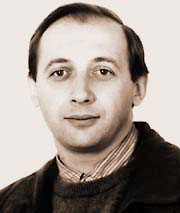
Vladimir Tarnopolski (b. 1955) studied composition with N. Sidelnikov and E. Denisov and musicology with Y. Cholopov at the Moscow State Conservatory (1973-1978, postgraduate course 1978-1980). He has been teaching composition there since 1992.
Tarnopolski is a representative of postmodernism, which is the opportunity to create new hierarchies, relations, techniques in each composition according to its own individual plan. He writes music in the avant-garde tradition, with clear structures, highly refined textures, and well thought-out details. Although his music combines elements of different stylistic sources (dodecaphony, collage, minimalism) and sonoristic effects with a delicate quality of sound material, Tarnopolski's pieces seem to be very concrete in the use of images and even characters. He often gives poetical titles to his compositions, but without literary programs. The sound of his works is intense and expressive. Tarnopolski is also a devoted advocate of Russian music in the world. He is the founder of the Studio for New Music at the Moscow Conservatory. He organizes the Moscow Forum Festival of Contemporary Music and is a board member of the Association of Contemporary Music in Russia (ASM).
Tarnopolski's music has been widely performed throughout the world, including the most prominent music festivals in Europe.
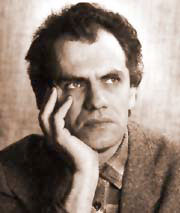
Aleksander Vustin (b. 1943) is a composer of mostly chamber music, although he has written some symphonic works and an opera. He follows the post-Webernian style of composition and has developed a special 12-tone technique in which he combines the strong 12-influenced (twelve tones repeated) organization and the diatonic structure of Russian medieval chant. With the help of this technique he tries to attain perfection and integrity in his compositions. Vustin's music maintains an original sense of time, with clear and beautiful motivic relations. It brings a very special sensation of intimacy, openness of expression-cordiality. While the composer does not attempt to make his music attractive, nor does he promote it, it always finds its way to the hearts of the listeners.
Vustin has participated in many important music festivals, including Sergey Prokofiev Festival, the Festival of New Russian Music in Duisbirg (Germany), ACM Festival in Paris (France), Moscow Autumn and Alternativa in Moscow.
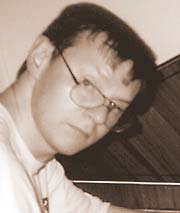
Sergei Zagny (b. 1960) is a radical experimentator and conceptualist. He has worked in almost every possible direction of composition: minimalism, electronic music, instrumental theater, happenings, verbal, other non-notated music and even structuralism. His compositions are often influenced by mathematics and are always very logical, even in the "free" genres. Most of his compositions are diatonic and built as multivariated structures, giving to the performer the freedom to choose (the simultaneous working-out of an adequate system of notation). In his pieces, Zagny tries to cognize cosmos in its whole. Zagny is a performer of improvised music playing piano and nontraditional instruments.
Zagny's music has been performed in Moscow, St. Petersburg, as well as other cities in Russia; in Italy, Germany, USA, England, France, Switzerland, on the festivals Alternativa, Unrecognized Movement (Volgograd), Bang on a Can (New York), European Media Art Festival (Osnabrück, Germany), The Third Mikhail Chekhov's Festival (Forrest Row, England), OPERATIVes Künstlehrfest (Berlin), Kykart (Tzarskoye Selo), Edinburgh International Festival (Edinburgh), Seminar with Tom Johnson (Saint Germain les Angles), Moscow Autumn (Moscow), and Mental Landscapes (Frauenfeld/Neuchâtel/Zürich, Switzerland).